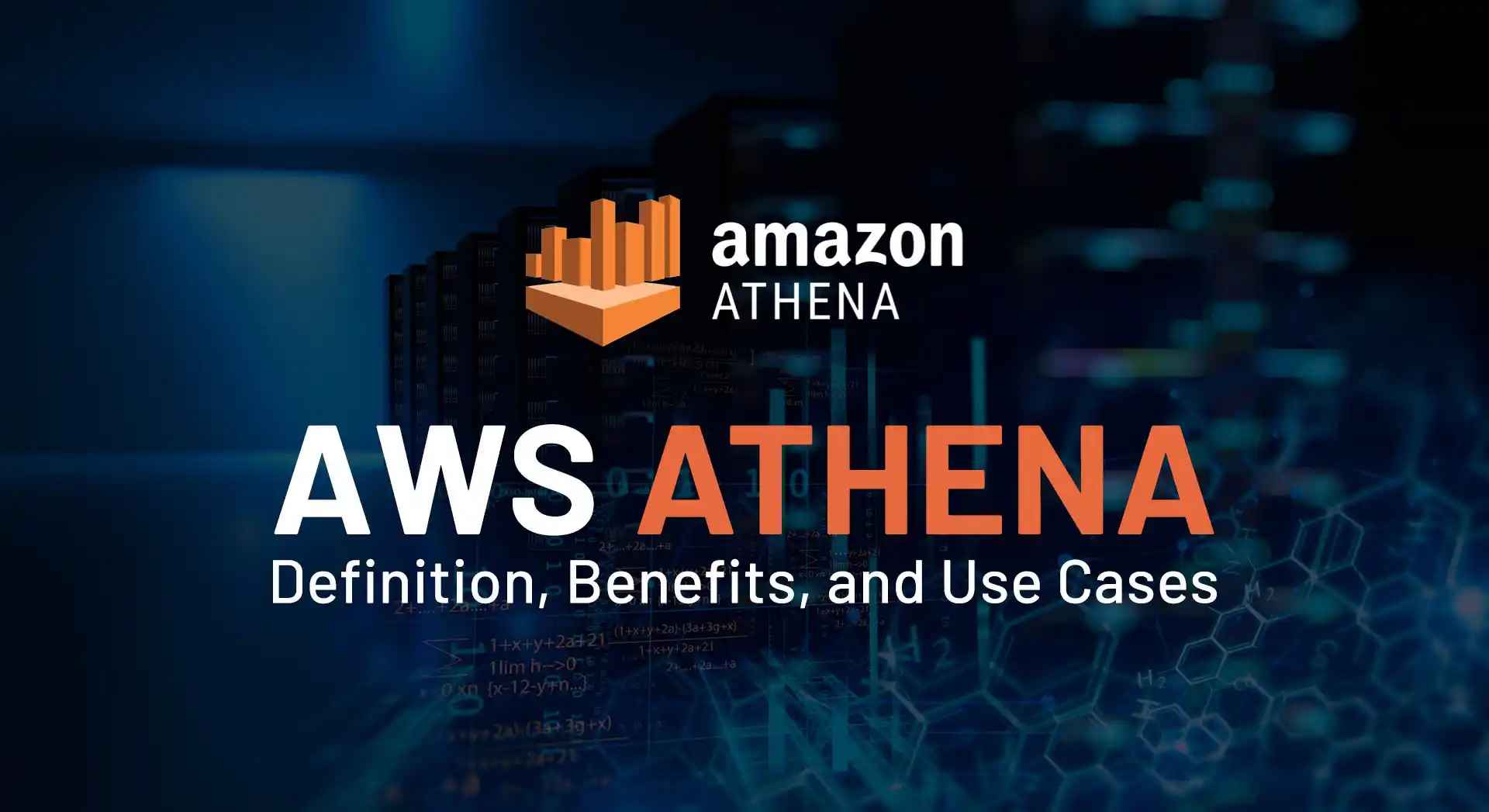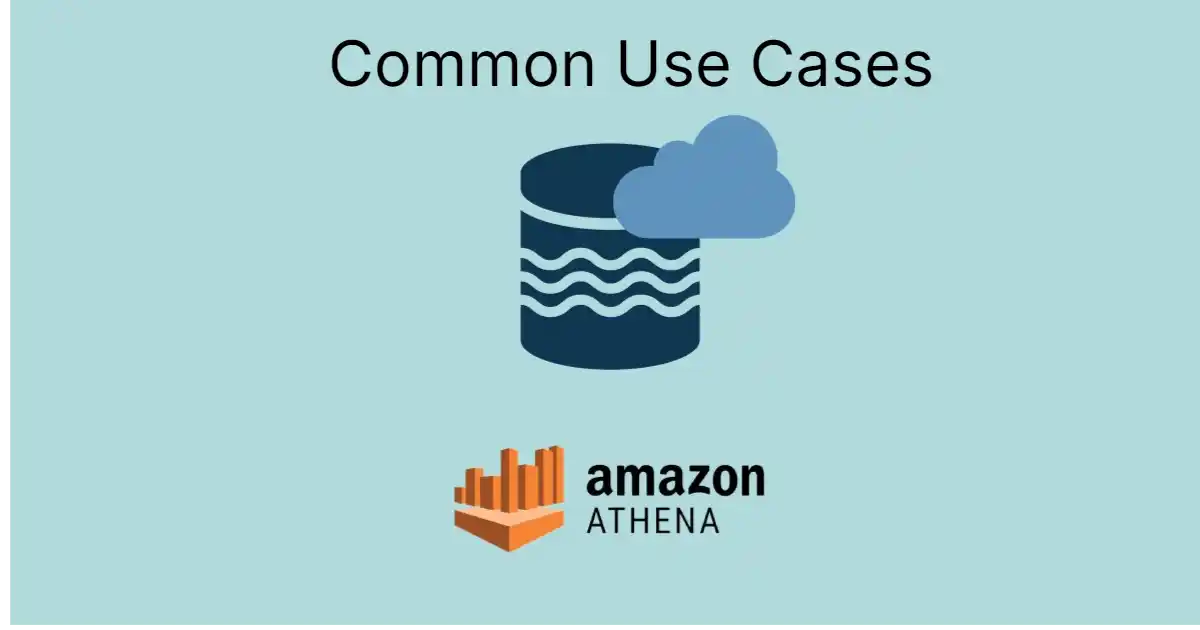AWS Athena: Serverless Interactive Querying Explained
Updated on : 7 May, 2025

Image Source: aws.amazon.com
Table Of Contents
- 1. Introduction
- 2. What is AWS Athena?
- 3. Core Architecture
- 4. Key Features
- 5. Serverless Advantage
- 6. Integration with AWS Services
- 7. Supported Data Sources and Formats
- 8. Security and Compliance
- 9. Pricing Models
- 10. Performance and Scalability
- 11. Common Use Cases
- 12. Best Practices
- 13. Limitations and Considerations
- 14. FAQs
- 15. Conclusion
Table Of Contents
Introduction
AWS Athena enables organizations to analyze petabytes of data directly in Amazon S3 using standard SQL, all without managing servers or clusters. Its serverless design, pay-per-query pricing, and seamless AWS integration make it a go-to solution for modern data lakes and analytics.

Image Source: aws.amazon.com
| Characteristic | Description |
|---|---|
| Service Name | AWS Athena |
| Service Type | Serverless, interactive query engine |
| Primary Data Source | Amazon S3 |
| Query Language | Standard SQL (ANSI SQL) |
| Supported Formats | CSV, JSON, Parquet, ORC, Avro |
| Infrastructure | No servers or clusters to manage |
| Billing Model | Pay-per-query (based on data scanned) |
| Metadata Management | Integrated with AWS Glue Data Catalog |
| Result Storage | Results saved to specified S3 bucket |
| Security | IAM-based access control, supports encryption |
| Popular Use Cases | Log analysis, ad-hoc querying, data exploration |
What is AWS Athena?
| Characteristic | Description |
|---|---|
| Service Type | Serverless, interactive query engine |
| Primary Data Source | Amazon S3 |
| Query Language | Standard SQL |
| Infrastructure | No servers or clusters to manage |
| Billing Model | Pay-per-query or provisioned capacity |
Service Type:
- AWS Athena is a serverless and interactive query engine, which means you don't need to manage any infrastructure to run SQL queries.
Primary Data Source:
- It works directly with data stored in Amazon S3, allowing you to query data without moving it to a separate database.
Query Language:
- Athena supports Standard SQL, so you can use familiar SQL syntax to write your queries.
Infrastructure:
- There are no servers or clusters to set up or manage—AWS handles all backend operations.
Billing Model:
- You pay per query based on the amount of data scanned, or you can opt for provisioned capacity for predictable workloads.
Cloud Computing Services with Hexadecimal Software
Core Architecture
| Component | Role |
|---|---|
| Client | Submit queries via Console, CLI, or SDK |
| Athena | Manages and runs SQL queries |
| Query Engine | Processes queries (uses Presto) |
| Metadata | Holds table schema (Glue Catalog) |
| Results | Stores output in S3 |
| Amazon S3 | Stores all data queried by Athena |
Client Applications
These are the interfaces through which users submit queries and receive results. Users can:
-
Use the AWS Management Console for a graphical interface.
-
Run queries via the AWS CLI (Command Line Interface) for automation or scripting.
-
Integrate with applications using AWS SDKs in languages like Python, Java, or Node.js.
These clients send SQL queries to Athena and receive output once processing is complete.
Athena Service
This is the central orchestrator of the query process. It:
-
Accepts SQL queries from clients.
-
Parses and plans execution.
-
Coordinates the distributed execution using the underlying query engine.
-
Communicates with other components like the metadata store and Amazon S3.
Athena handles all this serverlessly, with no need to manage infrastructure.
Query Engine
Athena uses a distributed SQL engine based on Presto (now Trino) to:
-
Execute queries in parallel across multiple nodes.
-
Optimize query performance through features like partition pruning and predicate pushdown.
-
Process complex SQL queries efficiently over large datasets.
This engine allows Athena to scale automatically and handle big data workloads efficiently.
Metadata Store
Athena relies on the AWS Glue Data Catalog (or Hive Metastore) to understand:
-
Table definitions (columns, data types).
-
Schema information.
-
Partitioning details.
This metadata is crucial for query planning and performance optimization. Without it, Athena wouldn’t know how to interpret the raw files in S3.
Result Set Storage
Once a query is executed, Athena:
-
Automatically saves the results to a designated Amazon S3 location.
-
Creates temporary files in that location for each result set.
-
Allows users to download or reference these results later.
You can also configure encryption and versioning for added security and auditability.
Amazon S3
This is the primary data lake storage for Athena. It holds:
-
Structured, semi-structured, or unstructured datasets.
-
Files in formats like CSV, JSON, ORC, Parquet, and Avro.
Athena reads data directly from S3, allowing you to run SQL queries without needing a traditional database.

Custom data insights, crafted with care using AWS Athena by Hexadecimal Software.
Key Features

Image Source: aws.amazon.com
| Feature | Benefit |
|---|---|
| Serverless | No infrastructure to manage; scales automatically |
| Standard SQL | Familiar syntax for querying |
| Integration | Works with AWS Glue, QuickSight, Lambda, Redshift |
| Multiple Data Formats | Supports CSV, JSON, Parquet, ORC, Avro, and more |
| Partitioning | Improves performance and reduces costs |
| Federated Queries | Query data beyond S3 (over 30 sources) |
| Secure | IAM, encryption, and S3 policies for access control |
| Highly Available | Built on S3’s 99.999999999% durability |
AWS Services with Hexadecimal Software
Serverless Advantage
| Serverless Benefit | Description |
|---|---|
| No Provisioning | Start querying immediately-no setup required |
| Automatic Scaling | Handles any workload size, from GBs to PBs |
| Cost-Efficient | Pay only for what you query |
| Zero Maintenance | No patching or upgrades needed |
No Provisioning:
- You can start querying data immediately without any need for infrastructure setup.
- There’s no need to provision servers or clusters in advance.
Automatic Scaling:
- Athena automatically adjusts to handle any size of workload, whether you're dealing with gigabytes (GB) or petabytes (PB) of data.
- It scales on demand to meet your needs.
Cost-Efficient:
- You only pay for the data you actually query.
- This makes it very cost-effective, as you're not paying for idle resources or unused capacity.
Zero Maintenance:
- Since Athena is serverless, you don’t need to worry about patching, upgrading, or maintaining the infrastructure.
- AWS takes care of all backend maintenance.
You Might Also Like
Integration with AWS Services
| Service | Integration Role |
|---|---|
| AWS Glue | Data cataloging, schema management, ETL |
| Amazon QuickSight | Data visualization and dashboards |
| AWS Lambda | Automated, event-driven query execution |
| Amazon Redshift | Data warehousing and deeper analytics |
| AWS CloudTrail | Audit logging and compliance |
AWS Glue:
- This service handles data cataloging, schema management, and ETL (Extract, Transform, Load) tasks, ensuring data is well-organized and ready for querying in Athena.
Amazon QuickSight:
- It is used for data visualization and creating dashboards from the query results produced by Athena, enabling insightful reporting.
AWS Lambda:
- Lambda is used to automate query execution in Athena based on specific events, enabling serverless automation without manual intervention.
Amazon Redshift:
- Redshift is a data warehouse solution that can be used in conjunction with Athena for deeper analytics and to store large volumes of structured data for efficient querying.
AWS CloudTrail:
- CloudTrail is responsible for audit logging and tracking compliance, ensuring that all activities in Athena are recorded for security and monitoring purposes.
DevOps Services with Hexadecimal Software
Supported Data Sources and Formats
| Data Source/Format | Support |
|---|---|
| Amazon S3 | Native, primary data source |
| RDS/Aurora | Federated queries via connectors |
| On-Premise/Other Clouds | Federated queries via connectors |
| CSV, JSON, Parquet, ORC, Avro | Supported natively |
| Compressed Files (gzip, snappy) | Supported |
Amazon S3:
- This is Athena's native and primary data source. Athena queries data directly stored in S3, making it the main repository for raw datasets.
RDS/Aurora:
- You can perform federated queries on data from Amazon RDS and Aurora using Athena's connectors, allowing you to query relational data alongside your S3 datasets.
On-Premise/Other Clouds:
- Athena also supports federated queries for data stored on-premises or in other clouds through connectors, enabling cross-cloud analytics.
CSV, JSON, Parquet, ORC, Avro:
- These formats are natively supported by Athena, making it easy to query structured and semi-structured data without needing conversion.
Compressed Files (gzip, snappy):
- Athena supports querying data in compressed formats like gzip and snappy, improving performance and reducing storage costs.
Google Cloud Services Services with Hexadecimal Software
Security and Compliance
| Security Feature | Description |
|---|---|
| IAM Policies | Fine-grained access control |
| S3 Bucket Policies | Restrict query access to specific data |
| Encryption | Supports server-side and client-side encryption |
| Audit Logging | Integrated with AWS CloudTrail |
| Compliance | Meets standards like GDPR, HIPAA |
IAM Policies:
- Fine-grained access control is provided through AWS Identity and Access Management (IAM), allowing you to manage who can access Athena and what operations they can perform.
S3 Bucket Policies:
- You can restrict query access to specific datasets stored in S3 by using bucket policies, ensuring that only authorized users can access sensitive data.
Encryption:
- Athena supports both server-side and client-side encryption, ensuring that your data is secure at rest and in transit.
Audit Logging:
- Athena is integrated with AWS CloudTrail, which enables audit logging of all queries and operations, helping you track access and comply with security audits.
Compliance:
- Athena complies with various security and regulatory standards like GDPR and HIPAA, making it suitable for industries with strict compliance requirements.
Pricing Models
| Pricing Model | Details |
|---|---|
| Pay-per-query | Billed per TB of data scanned |
| Provisioned Capacity | Reserve compute for consistent workloads |
| Hybrid | Mix both in a single account |
Pay-per-query:
- You are billed based on the amount of data scanned by your queries, typically charged per terabyte (TB).
- This model is cost-efficient for occasional or ad-hoc querying.
Provisioned Capacity:
- This model allows you to reserve compute resources for consistent workloads, ensuring predictable performance and cost management for regular or large-scale queries.
Hybrid:
- This model combines both pay-per-query and provisioned capacity within a single account, offering flexibility depending on the nature of the queries being run.
Performance and Scalability
| Performance Aspect | Description |
|---|---|
| Parallel Query Execution | Queries run in parallel for faster results |
| Automatic Optimization | No tuning or cluster management required |
| High Availability | Runs across multiple facilities for durability |
| Scalability | Handles workloads from gigabytes to petabytes |
Parallel Query Execution:
- Athena runs queries in parallel, leveraging distributed computing to process data quickly and return results faster, even for large datasets.
Automatic Optimization:
- There is no need for manual tuning or cluster management.
- Athena automatically optimizes queries for performance based on the data and the query structure.
High Availability:
- Athena is built with high availability, running across multiple facilities to ensure durability and uptime, even in case of hardware failures.
Scalability:
- Athena can handle workloads ranging from gigabytes to petabytes of data, allowing it to scale seamlessly for small and large datasets alike.
Common Use Cases

Image Source: aws.amazon.com
| Use Case | Description |
|---|---|
| Log Analysis | Analyze logs in S3 |
| Ad-hoc Queries | Quick, interactive insights |
| ETL | Transform data for analytics |
| BI | Power dashboards & reports |
| Compliance | Support audits & reporting |
Log Analysis:
- Athena is ideal for querying and analyzing logs that are stored in Amazon S3, such as application logs, CloudTrail logs, or VPC flow logs.
Ad-hoc Data Exploration:
- You can run interactive, on-the-fly queries to explore data quickly and gain insights without needing to set up complex infrastructure.
Data Transformation:
- Athena can be used for ETL (Extract, Transform, Load) tasks and preparing data for further analysis or loading into other systems.
Business Intelligence:
- It supports integration with tools like Amazon QuickSight to power dashboards and generate reports, helping organizations make data-driven decisions.
Compliance Reporting:
- Athena helps in analyzing audit and compliance data, useful for meeting regulatory requirements by generating required reports directly from stored data.
Best Practices
| Best Practice | Why It Matters |
|---|---|
| Partition Data | Reduces data scanned, lowers cost |
| Use Columnar Formats | Faster queries, less data scanned (Parquet, ORC) |
| Leverage Glue Catalog | Centralizes schema and metadata management |
| Secure Data | Apply IAM, S3 policies, and encryption |
| Monitor Usage | Track costs and optimize queries |
Partition Data:
- Organizing your data into partitions (like by date or region) helps Athena scan only relevant subsets, reducing costs and improving performance.
Use Columnar Formats:
- Storing data in formats like Parquet or ORC allows Athena to read only the needed columns, making queries faster and more efficient.
Leverage Glue Catalog:
- Using AWS Glue Data Catalog helps centralize your schema and metadata management, improving data organization and query accuracy.
Secure Data:
- Enforce IAM policies, S3 bucket policies, and encryption to protect your data and control access.
Monitor Usage:
- Keep track of Athena usage and query patterns to optimize performance and manage costs effectively.

Need powerful cloud solutions? Hexadecimal Software builds on AWS to impress.
Limitations and Considerations
| Limitation | Impact |
|---|---|
| Query Timeout | Long queries can fail |
| Query Limits | Simultaneous query cap |
| Schema-on-read | Needs organized data |
| High Costs | Big scans = big bills |
| Read-Only | No data updates |
Query Timeout:
- Queries that take too long may time out, especially if not optimized or running over large datasets.
Concurrent Query Limits:
- There are limits on the number of queries that can run at the same time per AWS account, which can affect performance in high-traffic environments.
Schema-on-read:
- Athena uses a schema-on-read model, meaning data must be well-organized and consistently formatted to avoid query issues.
Cost Control:
- If queries scan large amounts of data without optimization (like partitioning), it can lead to unexpected high costs.
No Built-in Updates:
- Athena is read-only, so it cannot update or delete data directly—you must modify the source data in S3 and refresh metadata if needed.
FAQs
Q1: How does Athena differ from Redshift?
A: Athena is serverless and best for ad-hoc S3 queries; Redshift is a managed data warehouse for complex, high-performance analytics.
Q2: Can Athena query data outside S3?
A: Yes, Athena supports federated queries to 30+ sources, including RDS, on-premises, and other clouds.
Q3: How is Athena billed?
A: You pay per TB scanned or reserve capacity for predictable workloads.
Q4: Is Athena secure for sensitive data?
A: Yes, it supports encryption, IAM, S3 policies, and audit logging.
Q5: What SQL dialect does Athena use?
A: Athena uses Presto SQL, compatible with ANSI SQL standards.
Q6: Can Athena update or delete data in S3?
A: No, Athena is read-only. Use Glue or EMR for data transformation.
Q7: Does Athena support data visualization?
A: Yes, via integration with Amazon QuickSight and other BI tools.
Q8: What are Athena’s performance tips?
A: Partition your data, use columnar formats, and optimize queries to reduce scanned data.
Q9: How does Athena handle schema changes?
A: Athena supports schema-on-read; manage schema evolution in Glue Data Catalog.
Q10: Is Athena suitable for real-time analytics?
A: Athena is best for interactive and batch analytics, not real-time streaming.
Q11: Can I automate Athena queries?
A: Yes, using AWS Lambda, Step Functions, or scheduled queries.
Q12: How do I secure query results?
A: Store results in encrypted S3 buckets and restrict access via IAM policies.
Connect with Hexadecimal Software for AWS Services
Seamless cloud architecture, DevOps, and data solutions expertly delivered on AWS by Hexadecimal Software.
Conclusion
AWS Athena is a powerful, serverless query service that allows you to analyze data directly in Amazon S3 using standard SQL. It's ideal for ad-hoc querying, log analysis, ETL, and BI workloads thanks to its scalability, integration with AWS services, and support for multiple data formats. With no infrastructure to manage, a pay-per-use model, and strong security features, Athena offers a flexible and cost-effective solution for modern data analytics—provided best practices like partitioning and format optimization are followed.







